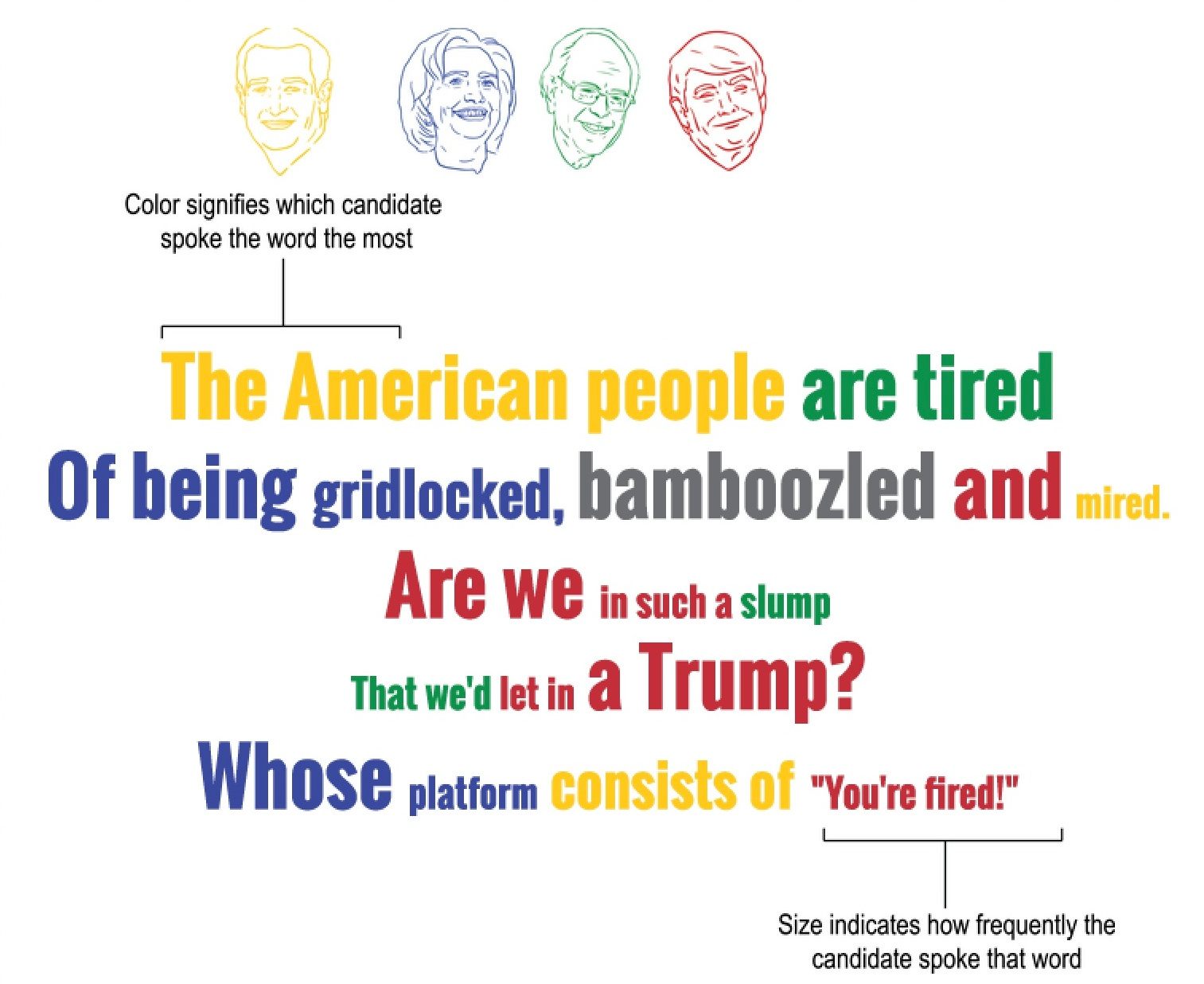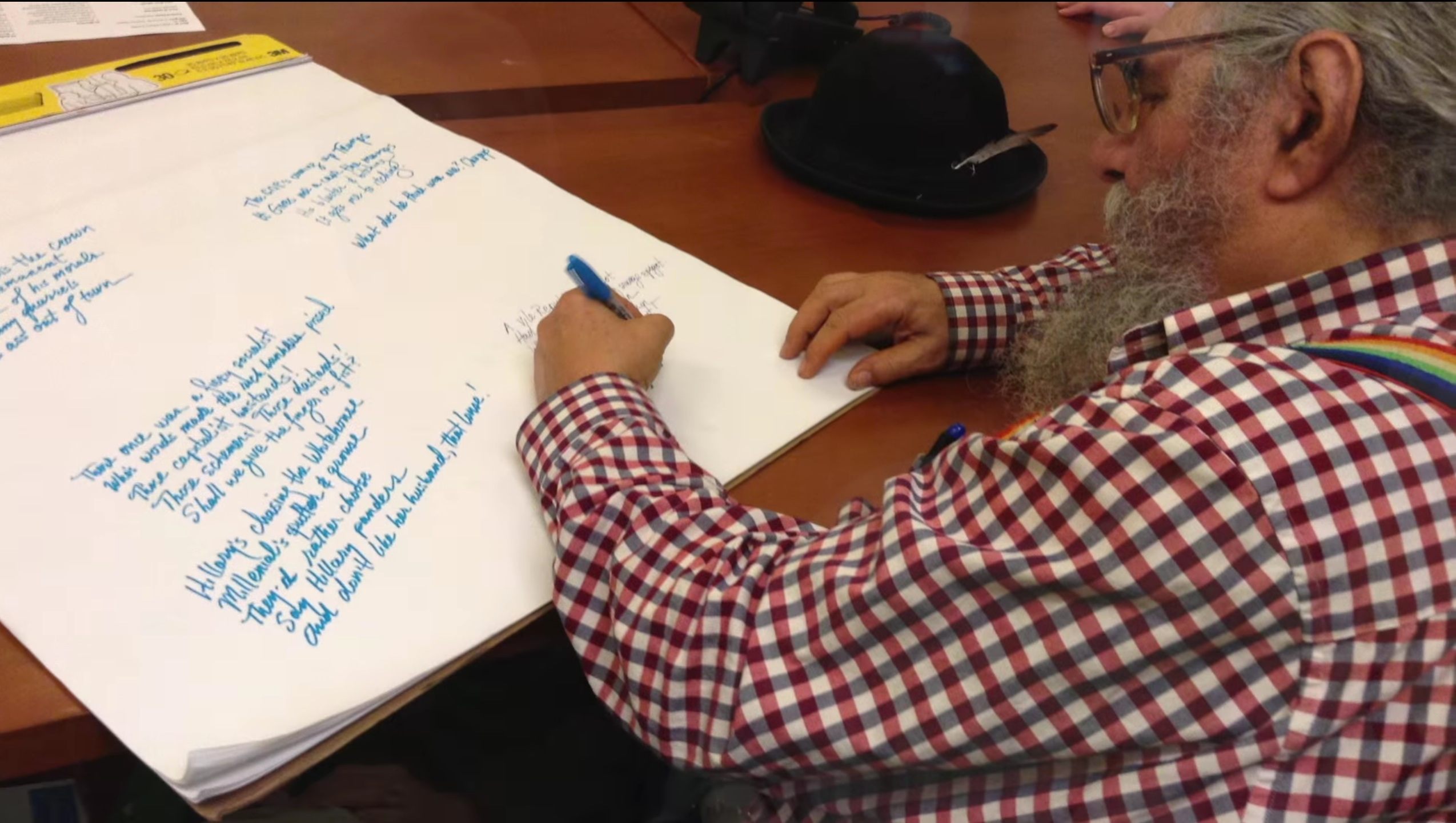Turning a Presidential Campaign Into a Set of Bawdy Limericks
There once was a candidate from Nantucket…

Campaign limericking inspired some spirited pamphlet vandalism. (Photo: Chloe Warfford/Emerson Engagement Lab)
Over a year into the U.S. presidential campaign season, it’s easy to be sick of certain words. “Wall,” for example. Or “billionaires.” Or even “the American people.”
But what if—rather than booming from podiums accompanied by broad hand gestures—these words appeared in a different, more lighthearted form? What if they arrayed themselves as, say, a limerick?
Catherine D’Ignazio, an Assistant Professor of Data Visualization and Civic Media at Emerson College, decided to find out. D’Ignazio is a member of the Institute for Infinitely Small Things, a Boston-area research group that aims to start political conversations in unexpected ways. Campaign speeches are, themselves, rarely unexpected, but maybe data about them could inspire something surprising.
“Candidates have particular things they repeat all the time,” D’Ignazio says. “Surfacing what some of those are seemed like an interesting proposition.”
With the help of her graduate assistant, she built a campaign corpus, compiling the four leading candidates’ stump speeches, debate appearances, and rallying cries until she had about 100,000 words for each. (The verbally prolific Trump racked up 300,000, she says.) She then ran them through an analyzer that surfaced the most common words and phrases: “border;” “middle-class;” “Iran;” “brothers and sisters.”

A Trump limerick by D’Ignazaio and Dave Raymond, made almost entirely of words from this year’s campaign speeches.
Remix material in hand, she sought the right poetic vessel. The limerick was, to her, an obvious choice—since the form first appeared in the early 18th century, it has balanced strict rhyme and meter with transgression and obscenity. Or, as in this Sanders example, sudden violence:
There once was a senator named Bernie,
Who embarked on a firebrand journey,
His supporters made noise,
In front of Trump’s boys,
And left the event in a gurney.
“This campaign has been so absurd and circus-like,” D’Ignazio says. “It just felt like an appropriate atmosphere for a really bawdy poetic form.”
Every good proposal needs a populace to carry it out. Earlier this month, D’Ignazio used free pizza to lure a very, very small subset of the American people to Emerson’s Engagement Lab. She gave a brief talk about the limerick’s history and particulars (voter education!). She passed out brochures detailing each candidate’s background and positions, and a word cloud made up of their most favored phrases (campaign literature!). Once everyone was up to speed, the work began in earnest. One early Clinton attempt:
Hillary’s chasing the White House,
Millennials sputter and grouse,
They’d rather choose Sanders,
Say Hillary panders,
And don’t like her husband that louse!
After about an hour of intense limericking, the poetic fruits were displayed on the walls, and favorites were determined by popular vote (direct democracy!). In true American fashion, the night’s big winner was not a strict limerick at all, but a loose attempt at the form by an extremely charismatic seven-year-old boy. “He really wanted to win, so he kept going around asking people to vote for him,” says D’Ignazio. “He was very successful.”

A dedicated limerick-writer at the Boston event. (Photo: Chloe Warfford/Emerson Engagement Lab)
Some of the more traditional limericks, color-coded according to which word is preferred by which candidate, are being displayed at Harvard during today’s Political Analytics conference. A similar party was held by another Institute for Infinitely Small Things member in Des Moines, Iowa, and one is planned for Connecticut. Here’s a citizen of Des Moines’s take on Cruz:
For being a conservative pillar,
Cruz made the contest quite the thriller,
He’s stayed in the race,
And held second place…
Not bad for the Zodiac Killer.
Many of the results so far, D’Ignazio readily admits, have been poetically partisan—as this example attests, most of the words that aren’t ripped straight from speeches involve hairpieces and Zodiac killers. But she thinks this has less to do with the form’s restrictions than with the poets themselves—after all, the Emerson event was full of Boston-adjacent academics, who call their own town the People’s Republic of Cambridge. “I think it would be really interesting if conservative campaign limerick parties were staged,” says D’Ignazio. “Maybe we could have a war of the limericks.”
To those who feel metrically underrepresented (and those who don’t, but would like to join the fun)—the gauntlet has been thrown. You can see the rest of the limericks on the project website, and throw your own party using the group’s official kit. Send your completed limericks to infinitelysmallthings@googlegroups.com. That is, unless you feel like this disheartened poet:
I’ve had it! My limericks are junk,
This whole election is bunk,
Though I’ve had a blast,
This season shall pass,
Back to Congressional funk.








Follow us on Twitter to get the latest on the world's hidden wonders.
Like us on Facebook to get the latest on the world's hidden wonders.
Follow us on Twitter Like us on Facebook